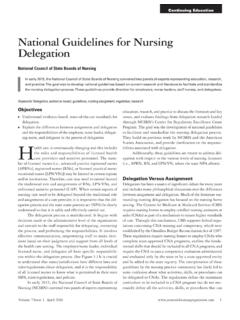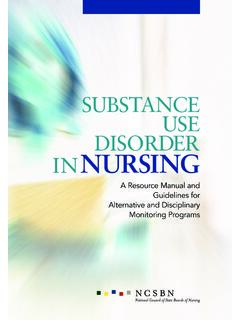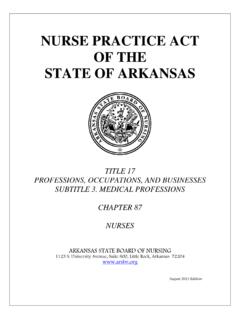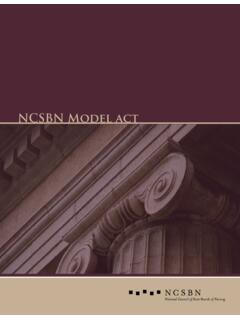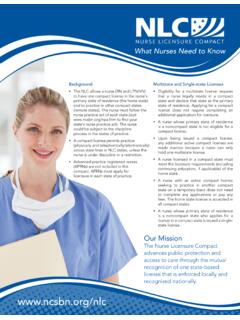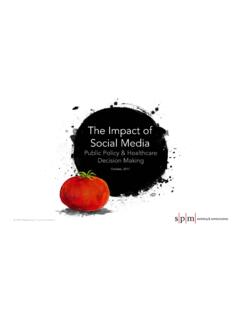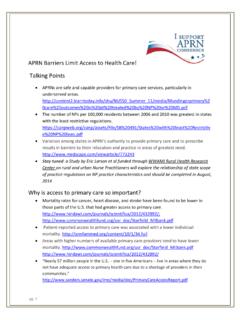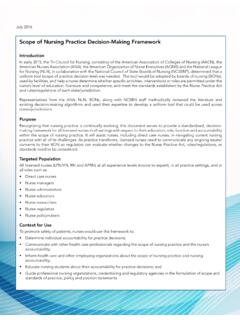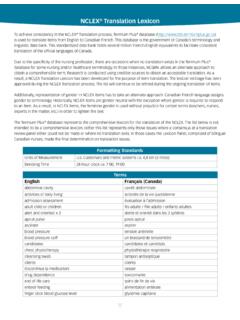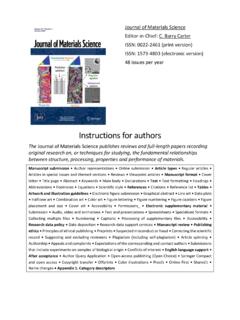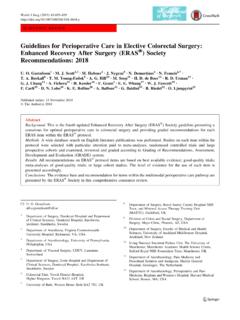Transcription of White Paper: A Nurse’s Guide to the Use of Social Media
1 1 White Paper: A Nurse s Guide to the Use of Social MediaAugust 2011 IntroductionThe use of Social Media and other electronic communication is increasing exponentially with growing numbers of Social Media outlets, platforms and applications, including blogs, Social networking sites, video sites, and online chat rooms and forums. Nurses often use electronic Media both personally and professionally. Instances of inappropriate use of electronic Media by nurses have been reported to boards of nursing (BONs) and, in some cases, reported in nursing literature and the Media . This document is intended to provide guidance to nurses using electronic Media in a manner that maintains patient privacy and Media can benefit health care in a variety of ways, including fostering professional connections, promoting timely communication with patients and family members, and educating and informing consumers and health care are increasingly using blogs, forums and Social networking sites to share workplace experiences particularly events that have been challenging or emotionally charged.
2 These outlets provide a venue for the nurse to express his or her feelings, and reflect or seek support from friends, colleagues, peers or virtually anyone on the Internet. Journaling and reflective practice have been identified as effective tools in nursing practice. The Internet provides an alternative Media for nurses to engage in these helpful activities. Without a sense of caution, however, these understandable needs and potential benefits may result in the nurse disclosing too much information and violating patient privacy and confidentiality. Health care organizations that utilize electronic and Social Media typically have policies governing employee use of such Media in the workplace. Components of such policies often address personal use of employer computers and equipment, and personal computing during work hours. The policies may address types of websites that may or may not be accessed from employer computers.
3 Health care organizations also maintain careful control of websites maintained by or associated with the organization, limiting what may be posted to the site and by employer s policies, however, typically do not address the nurse s use of Social Media outside of the workplace. It is in this context that the nurse may face potentially serious consequences for inappropriate use of Social and PrivacyTo understand the limits of appropriate use of Social Media , it is important to have an understanding of confidentiality and privacy in the health care context. Confidentiality and privacy are related, but distinct concepts. Any patient information learned by the nurse during the course of treatment must be safeguarded by that nurse. Such information may only be disclosed to other members of the health care team for health care purposes. Confidential information should be shared only with the patient s informed consent, when legally required or where failure to disclose the information could result in significant harm.
4 Beyond these very limited exceptions the nurse s obligation to safeguard such confidential information is universal. Privacy relates to the patient s expectation and right to be treated with dignity and respect. Effective nurse-patient relationships are built on trust. The patient needs to be confident that their most personal information and their basic dignity will be protected by the nurse. Patients will be hesitant to disclose personal information if they fear it will be disseminated beyond those who have a legitimate need to know. Any breach of this trust, even inadvertent, damages the particular nurse-patient relationship and the general trustworthiness of the profession of nursing. Federal law reinforces and further defines privacy through the Health Insurance Portability and Accountability Act (HIPAA). HIPAA regulations are intended to protect patient privacy by defining individually identifiable information and establishing how this information may be used, by whom and under what circumstances.
5 The definition of individually identifiable information includes any information that relates to the past, present or future physical or mental health of an individual, or provides enough information that leads someone to believe the information could be used to identify an individual. Breaches of patient confidentiality or privacy can be intentional or inadvertent and can occur in a variety of ways. Nurses may breach confidentiality or privacy with information he or she posts via Social Media . Examples may include comments on Social 2networking sites in which a patient is described with sufficient detail to be identified, referring to patients in a degrading or demeaning manner, or posting video or photos of patients.
6 Additional examples are included at the end of this ConsequencesPotential consequences for inappropriate use of Social and electronic Media by a nurse are varied. The potential consequences will depend, in part, on the particular nature of the nurse s conduct. BON ImplicationsInstances of inappropriate use of Social and electronic Media may be reported to the BON. The laws outlining the basis for disciplinary action by a BON vary between jurisdictions. Depending on the laws of a jurisdiction, a BON may investigate reports of inappropriate disclosures on Social Media by a nurse on the grounds of: Unprofessional conduct; Unethical conduct; Moral turpitude; Mismanagement of patient records; Revealing a privileged communication; and Breach of confidentiality. If the allegations are found to be true, the nurse may face disciplinary action by the BON, including a reprimand or sanction, assessment of a monetary fine, or temporary or permanent loss of licensure.
7 A 2010 survey of BONs conducted by NCSBN indicated an overwhelming majority of responding BONs (33 of the 46 respondents) reported receiving complaints of nurses who have violated patient privacy by posting photos or information about patients on Social networking sites. The majority (26 of the 33) of BONs reported taking disciplinary actions based on these complaints. Actions taken by the BONs included censure of the nurse, issuing a letter of concern, placing conditions on the nurse s license or suspension of the nurse s ConsequencesImproper use of Social Media by nurses may violate state and federal laws established to protect patient privacy and confidentiality. Such violations may result in both civil and criminal penalties, including fines and possible jail time. A nurse may face personal liability. The nurse may be individually sued for defamation, invasion of privacy or harassment.
8 Particularly flagrant misconduct on Social Media websites may also raise liability under state or federal regulations focused on preventing patient abuse or exploitation. If the nurse s conduct violates the policies of the employer, the nurse may face employment consequences, including termination. Additionally, the actions of the nurse may damage the reputation of the health care organization, or subject the organization to a law suit or regulatory consequences. Another concern with the misuse of Social Media is its effect on team-based patient care. Online comments by a nurse regarding co-workers, even if posted from home during nonwork hours, may constitute as lateral violence. Lateral violence is receiving greater attention as more is learned about its impact on patient safety and quality clinical outcomes. Lateral violence includes disruptive behaviors of intimidation and bullying, which may be perpetuated in person or via the Internet, sometimes referred to as cyber bullying.
9 Such activity is cause for concern for current and future employers and regulators because of the patient-safety ramifications. The line between speech protected by labor laws, the First Amendment and the ability of an employer to impose expectations on employees outside of work is still being determined. Nonetheless, such comments can be detrimental to a cohesive health care delivery team and may result in sanctions against the nurse. Common Myths and Misunderstandings of Social MediaWhile instances of intentional or malicious misuse of Social Media have occurred, in most cases, the inappropriate disclosure or posting is unintentional. A number of factors may contribute to a nurse inadvertently violating patient privacy and confidentiality while using Social Media . These may include: A mistaken belief that the communication or post is private and accessible only to the intended recipient. The nurse may fail to recognize that content once posted or sent can be disseminated to others.
10 In fact, the terms of using a Social Media site may include an extremely broad waiver of rights to limit use of The solitary use of the Internet, even while posting to a Social Media site, can create an illusion of privacy. 1 One such waiver states, By posting user content to any part of the site, you automatically grant the company an irrevocable, perpetual, nonexclusive transferable, fully paid, worldwide license to use, copy, publicly perform, publicly display, reformat, translate, excerpt (in whole or in part), distribute such user content for any purpose. Privacy Commission of Canada. (2007, November 7). Privacy and Social networks [Video file]. Retrieved from 3 A mistaken belief that content that has been deleted from a site is no longer accessible.
